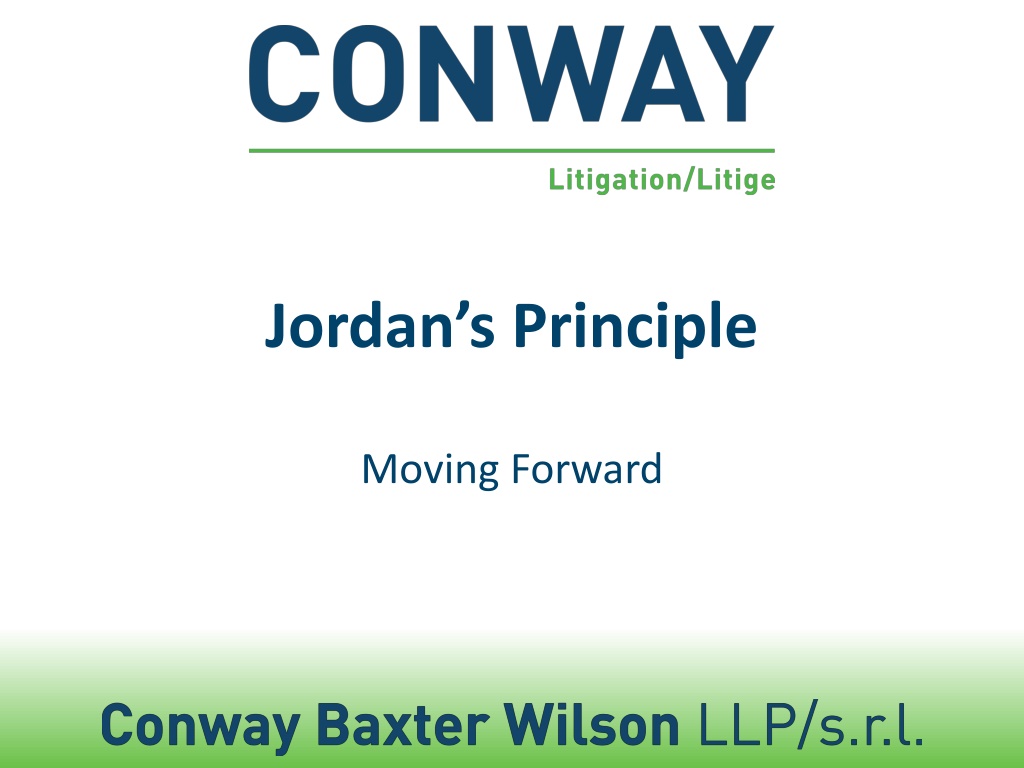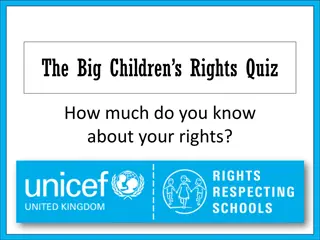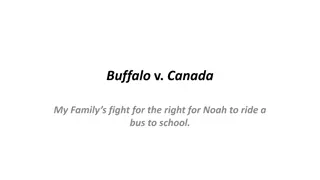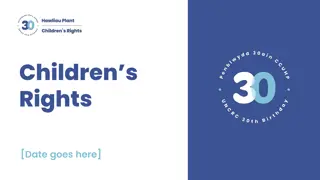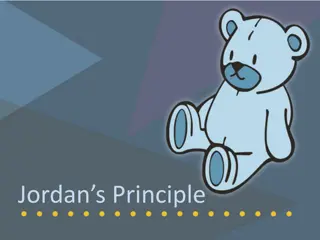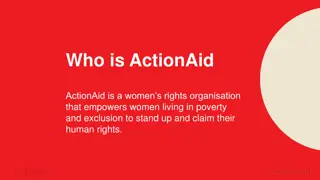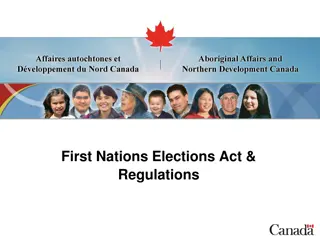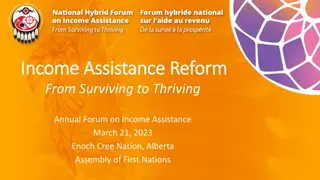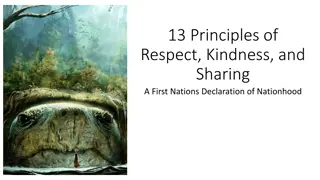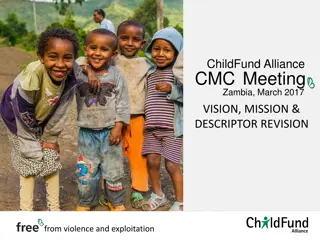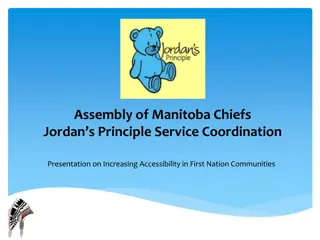Jordan's Principle: Advocating for First Nations Children's Rights
Jordan's Principle is a vital advocacy tool aimed at ensuring equitable access to necessary services for First Nations children, emphasizing prompt resolution of jurisdictional disputes. Originating from the story of Jordan River Anderson, its implementation has faced challenges and legal battles. Calls to fully implement Jordan's Principle have been made by various entities, including the Canadian Human Rights Tribunal and the Truth and Reconciliation Commission. Progress and setbacks have been noted, highlighting the ongoing importance of this principle in safeguarding the well-being of Indigenous children.
Uploaded on Sep 22, 2024 | 0 Views
Download Presentation

Please find below an Image/Link to download the presentation.
The content on the website is provided AS IS for your information and personal use only. It may not be sold, licensed, or shared on other websites without obtaining consent from the author. Download presentation by click this link. If you encounter any issues during the download, it is possible that the publisher has removed the file from their server.
E N D
Presentation Transcript
Jordans Principle Moving Forward
Jordan River Anderson - Born in Norway House Cree Nation in 1999 - Due to a serious medical condition and lack of services on-reserve, surrendered to provincial care - Stabilized at the age of two, but did not go into specialized foster home as federal and provincial governments could not agree who would pay - Passed away at the age of five, still in the hospital
House of Commons Motion 296 That, in the opinion of the House, the government should immediately adopt a child first principle, based on Jordan s Principle, to resolve jurisdictional disputes involving the care of First Nations children Yeas: 262 ; Nays: 0
2009: MOU on the Federal Response to Jordan s Principle - Focused on cases involving a jurisdictional dispute between a provincial government and the federal government and on children with multiple disabilities requiring services from multiple service providers. - Fund to address Jordan s Principle cases: $11 million - Jordan s Principle cases accepted: 0
Truth and Reconciliation Commission Call to Action #3 We call upon all levels of government to fully implement Jordan s Principle
Canadian Human Rights Tribunal 2016 CHRT 2 (Jan 26, 2016) - [ ] Such an approach defeats the purpose of Jordan s Principle and results in service gaps, delays and denials for First Nations children on reserve. - AANDC is also ordered to cease applying its narrow definition of Jordan s Principle and to take measures to immediately implement the full meaning and scope of Jordan s Principle
Canadian Human Rights Tribunal 2016 CHRT 10 (Apr 26, 2016) - [ ] The order is to immediately implement , not immediately start discussions to review the definition in the long-term. - [ ] the Panel orders INAC to immediately consider Jordan s Principle as including all jurisdictional disputes (this includes disputes between federal government departments) and involving all First Nations children (not only those with multiple disabilites).
Jordans Principle Child First Intiative (July 6, 2016) - Focused on First Nations children with a disability or short- term condition (initially limited to children living on-reserve) - Limited to health or social services within the normative standard of care in the province/territory of residence - Fund to address Jordan s Principle cases: $327 million - Fund for Enhanced Service Coordination: $38 million - Jordan s Principle cases accepted (July 2016 to February 2017): 3,281
Canadian Human Rights Tribunal 2017 CHRT 14 (May 26, 2017) - [ ] Canada s definition of Jordan s Principle does not fully address the findings in the Decision and is not sufficiently responsive to the previous orders of this Panel. - While Canada has indeed broadened its application of Jordan s Principle since the Decision [ ] it nevertheless continues to narrow the application of the principle to certain First Nations children
Canadian Human Rights Tribunal 2017 CHRT 14 (May 26, 2017) - [ ] the emphasis on the normative standard of care or comparable services [ ] does not answer the findings in the Decision with respect to substantive equality and the need for culturally appropriate services - [ ] the needs of each individual child must be considered and evaluated
2017 CHRT 14 Definition Ordered - Jordan s Principle applies equally to all First Nations children - Jordan s Principle applies to all government services - Where the service meets the normative standard, the government department of first contact pays for the service without case conferencing or other administrative steps - Where the service beyond the normative standard, the government department of first contact will evaluate the child s individual needs to determine if the service should be provided to ensure substantive equality
Canadian Human Rights Tribunal 2017 CHRT 35 (November 2, 2017) - Canada files for judicial review in Federal Court on June 25, 2017, challenging the process ordered by the Tribunal - Parties agree to amendments to 2017 CHRT 14, to allow for clinical case conferencing where further information is reasonably necessary to understand the First Nations child s clinical needs - All other cases most be resolved within the following timeframes: - Urgent cases involving irremediable harm: Immediately - Urgent individual cases: 12 hours - Urgent group cases: 48 hours - Individual cases: 48 hours - Group cases: 1 week
Performance since 2017 CHRT 35 - 111,843 requests approved from July 6, 2016 to July 31, 2018 - FY 2016/17: 4,940 requests approved - FY 2017/18: 76,891 requests approved - FY 2018/19 (to July 31): 30,012 requests approved
Performance since 2017 CHRT 35 - Continuing areas of concern - Definition of First Nations child - Integration of best interest of the child consideration - Procedure for identifying and responding to urgent cases - Focal Point focus on service gaps rather than substantive equality
Performance since 2017 CHRT 35 - Continuing areas of concern - Unnecessary requests for information - Escalation to Headquarters - Service Standard Compliance - Appeals process
Performance since 2017 CHRT 35 - Service standard compliance large variability - Monthly averages vary from 51% to 90% (below 80% since February 2018) - High variability within provinces - Alberta 94% in Jan 18 to 16% in May 18 - High variability between provinces - Manitoba 90% in July 18 to Quebec 34% in July 18
Performance since 2017 CHRT 35 - High number of cases escalated to Headquarters - April July 2018: 580 cases escalated (170 denied) - Escalation to Headquarters causes delays - April 2018: 1.3% of cases within service standard - May 2018: 39.8% of cases within service standard - June 2018: 7.2% of cases within service standard - July 2018: 5.0% of cases within service standard
Performance since 2017 CHRT 35 - Low number of appeals April to July 2018 - 8 appeals (6 allowed; 2 denied)
Implementation and Next Steps - Canadian Human Rights Tribunal Oversight - Consultation Committee on Child Welfare (CHRT) - Jordan s Principle Operational Committee (ISC) - Jordan s Principle Action Table (NAC)
Activity in the Provinces Alberta - Health Minister endorses Jordan s Principle (2017) - Child intervention action plan commits to full implementation of Jordan s Principle in 2018/19 Ontario 2017 - New Child and Family Services Act, 2017 preamble endorses Jordan s Principle and provides for regulations to resolve inter-jurisdictional and intra-jurisdicitonal disputes in respect of services under the Act
Questions? 1-855-JP-CHILD 1-855-572-4453
